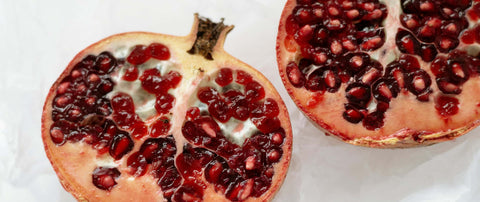The pomegranate, also known as the "fruit of paradise," has been recognized for thousands of years as a nourishing fruit with deep cultural and religious significance. Today, it is celebrated as an exceptional superfood, and rightly so—this power-packed fruit offers an impressive range of benefits! But where does the pomegranate come from, and how healthy is it really? In this blog post, we will answer these and many other questions, as well as explore the facts and studies surrounding the pomegranate.
Inhaltsverzeichnis
Where does the pomegranate come from?
The pomegranate (Punica granatum) belongs to the family Lythraceae and is botanically classified as a berry. It has existed for thousands of years, with references dating back to antiquity, and it is frequently mentioned in Greek mythology. During the Middle Ages, the red fruit was a central theme in many paintings and sacred texts. The pomegranate is one of the world’s oldest cultivated fruits. Its origin traces back to the region of modern-day Iran, but today, pomegranates are grown almost everywhere—from the Mediterranean region to South America, the Middle East, South Africa, and Australia. Due to its long history, the pomegranate has accumulated various cultural myths and meanings over time. It symbolizes fertility, eternal life, beauty, power, and sensuality.
Uses: The Versatility of Pomegranates
Traditional and Ayurvedic Medicine
The health benefits of pomegranates were recognized early on. Even in ancient medicine, this fruit was considered a remedy for many ailments, such as fever and digestive problems. In Ayurvedic medicine—an ancient healing practice from India—pomegranates continue to be highly valued. The entire fruit, including its seeds, skin, and root bark, is used for its beneficial properties. Pomegranates are especially known for their anti-inflammatory and digestion-boosting effects.
In Ayurvedic practices, this superfood is associated with fertility and is used by both men and women to support reproductive health.
Cosmetic Industry
The cosmetic industry quickly recognized the potential of this unique fruit, incorporating pomegranate extracts into numerous creams, lotions, oils, and serums. Pomegranates are rich in antioxidants, which help protect the skin from free radicals. Additionally, they provide moisture, making pomegranate a popular ingredient in anti-aging products.
Culinary Use
The aromatic, sweet-tart flavor of pomegranate makes it a versatile ingredient in the culinary world. It can be found in juices, syrups, extracts, smoothies, bowls, and spritzers—there's no limit to how you can enjoy it! Another way to experience the benefits of pomegranate is through dietary supplements. How Healthy Is the Pomegranate Really? The health benefits of this red fruit come from its abundance of nutrients. The following nutrients are found in 100 grams of pomegranate, making it a standout superfood:
How Healthy Is the Pomegranate Really?
The health benefits of this red fruit come from its abundance of nutrients. The following nutrients are found in 100 grams of pomegranate, making it a standout superfood: 1
| Nutrient | Nutritional Value/100 g |
|---|---|
| Vitamin A | 1 µg-RE |
| Beta-carotene | 12 µg |
| Vitamin B1 | 0.06 mg |
| Vitamin B2 | 0.02 mg |
| Vitamin B3 | 0.24 mg |
| Vitamin B5 | 0.31 mg |
| Vitamin B6 | 0.03 mg |
| Vitamin B9 | 8.8 µg |
| Vitamin C | 10.8 mg |
| Vitamin E | 0.08 mg |
| Potassium | 230 mg |
| Sodium | 2 mg |
| Chloride | 44 mg |
| Calcium | 9.5 mg |
| Magnesium | 12 mg |
| Phosphorus | 27 mg |
| Iron | 0.2 mg |
| Iodine | 1.5 µg |
| Zinc | 0.2 mg |
| Selenium | 0.5 µg |
In addition to vitamins and minerals, pomegranates are also rich in fiber and polyphenols, which are secondary plant compounds found in many fruits, vegetables, teas, and red wine. Polyphenols have antioxidant and anti-inflammatory effects, and pomegranates are especially high in them.

Scientific Findings
Several studies suggest that pomegranates may help reduce blood pressure, blood sugar, body weight, triglycerides, and total cholesterol. They may also increase HDL cholesterol "good" cholesterol and improve insulin sensitivity.2 Additionally, numerous specific studies have examined the impact of pomegranates on particular diseases. Here are some of these findings:
Cardiovascular Diseases
Research suggests that components of pomegranates—such as tannins, flavonoids, and alkaloids—have positive effects on the cardiovascular system by reducing oxidative stress, enhancing the enzymatic antioxidant system, and offering anti-inflammatory benefits. 3
High Blood Pressure
A meta-analysis of 14 clinical trials found that consuming ≤ 300 ml of pomegranate juice reduced systolic blood pressure (SBP). After a study period of ≤ 2 months, both systolic and diastolic blood pressure levels were significantly lowered. Surprisingly, higher daily consumption of pomegranate juice had no effect on SBP but did lower diastolic blood pressure (DBP). 4
Inflammation and Oxidative Stress
Multiple studies have been reviewed to determine if pomegranates positively impact inflammation and oxidative stress. Results indicated that pomegranate consumption positively affected oxidative stress biomarkers and inflammation in adults, making it a good option for reducing oxidative stress and inflammation, particularly in patients with cardiovascular diseases. 5
Cancer
In vitro and in vivo studies have shown that pomegranates’ anti-inflammatory and antioxidant properties help prevent cellular changes and inhibit the growth of tumor cells. These properties enable the regulation of gene expression, modulation of cellular mechanisms, and prevention of tumor metastasis. Some clinical studies also suggest that pomegranate compounds may help prevent and support the treatment of cancers, particularly colon and prostate cancers. 6
In another study, the goal was to determine how pomegranate seed extract affects the cell cycle (life phase of a cell) and apoptosis (programmed cell death) in the MCF-7 cell line (a breast cancer cell line) when these cells are co-cultured with ADSCs (adipose-derived stem cells). The study found that the pomegranate seed extract had the strongest effect on the MCF-7 cells when used together with the adipose stem cells. More MCF-7 cells were found to be in an early cell cycle phase, meaning that the growth of the cells had not progressed further. Additionally, some cells had died. This indicates that the combination of pomegranate seed extract and ADSCs has the potential to suppress tumor cells. 7
Cognitive Dysfunction
There is evidence that pomegranates may have positive effects on cognitive function. A review of several studies suggests that pomegranate consumption could help improve cognitive performance, making it a potential option for mitigating cognitive decline. 8
Anti-Aging Effects
One study examined the effects of fermented pomegranate extract on skin health. The study tested both an ingestible supplement (juice) and a topical serum. After 4–8 weeks, participants who consumed the juice reported improvements in skin hydration, brightness, elasticity, and collagen density. The serum also showed benefits after 4 weeks, such as improved hydration, brightness, elasticity, spot reduction, UV spot reduction, and collagen density. Daily consumption of fermented pomegranate extract thus supports skin protection against oxidative stress and slows the aging process. 9
Anzeige

Order the superfood pomegranate now!
The vibrant purple superfood is not only delicious and aromatic but also incredibly nutrient-rich. Whether eaten fresh or enjoyed in bowls, smoothies, or supplements, the pomegranate is a great addition to any diet. From supporting cardiovascular health, managing blood pressure, and improving skin health to showing promising effects in cancer studies, pomegranates offer wide-ranging health benefits. Nutritional supplements containing pomegranate extracts also provide a convenient way to enjoy these health-promoting properties.
Sources:
-
Nährwertdaten. Granatapfel
https://naehrwertdaten.ch/de/search/#/food/340022
-
Laurindo LF, Barbalho SM, Marquess AR, Grecco AIS, Goulart RA, Tofano RJ, Bishayee A. Pomegranate (Punica granatum L.) and Metabolic Syndrome Risk Factors and Outcomes: A Systematic Review of Clinical Studies. Nutrients. 2022 Apr 16;14(8):1665. doi: 10.3390/nu14081665. PMID: 35458227; PMCID: PMC9032502.
- Delgado NTB, Rouver WN, Dos Santos RL. Protective Effects of Pomegranate in Endothelial Dysfunction. Curr Pharm Des. 2020;26(30):3684-3699. doi: 10.2174/1381612826666200406152147. PMID: 32250215.
- Ghaemi F, Emadzadeh M, Atkin SL, Jamialahmadi T, Zengin G, Sahebkar A. Impact of pomegranate juice on blood pressure: A systematic review and meta-analysis. Phytother Res. 2023 Oct;37(10):4429-4441. doi: 10.1002/ptr.7952. Epub 2023 Jul 17. PMID: 37461211.
- Bahari H, Rafiei H, Goudarzi K, Omidian K, Asbaghi O, Kolbadi KSH, Naderian M, Hosseini A. The effects of pomegranate consumption on inflammatory and oxidative stress biomarkers in adults: a systematic review and meta-analysis. Inflammopharmacology. 2023 Oct;31(5):2283-2301. doi: 10.1007/s10787-023-01294-x. Epub 2023 Jul 28. PMID: 37507609.
- Hussein L, Gouda M, Buttar HS. Pomegranate, its Components, and Modern Deliverable Formulations as Potential Botanicals in the Prevention and Treatment of Various Cancers. Curr Drug Deliv. 2021;18(10):1391-1405. doi: 10.2174/1567201818666210203180853. PMID: 33538675.
- Moradi-Gharibvand N, Setayeshmehr M, Kazemi M, Safaee A, Khorsandi LS, Nejad DB, Hasheminia SJ, Hashemibeni B. Pomegranate seed extract enhances the inhibitory effect of adipose-derived mesenchymal stem cells on breast cancer cell line in co-culture conditions. Res Pharm Sci. 2022 Jul 14;17(4):372-382. doi: 10.4103/1735-5362.350238. PMID: 36034084; PMCID: PMC9400461.
- Molani-Gol R, Foroumandi E, Alizadeh M, Kheirouri S. Pomegranate and Cognitive Performance: A Systematic Review. Curr Pharm Des. 2023;29(12):928-939. doi: 10.2174/1381612829666230330163645. PMID: 37005403.
- Chan LP, Tseng YP, Liu C, Liang CH. Fermented pomegranate extracts protect against oxidative stress and aging of skin. J Cosmet Dermatol. 2022 May;21(5):2236-2245. doi: 10.1111/jocd.14379. Epub 2021 Aug 20. PMID: 34416060.




 DE-ÖKO-006
DE-ÖKO-006
